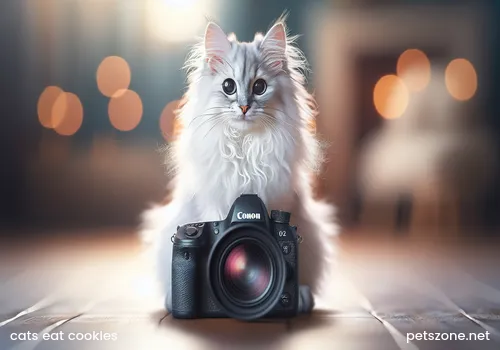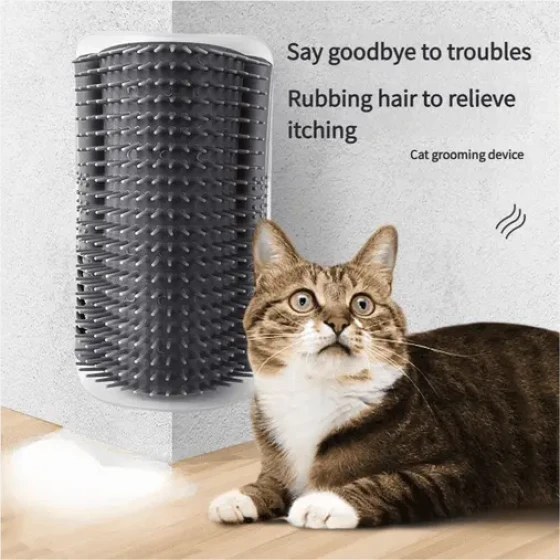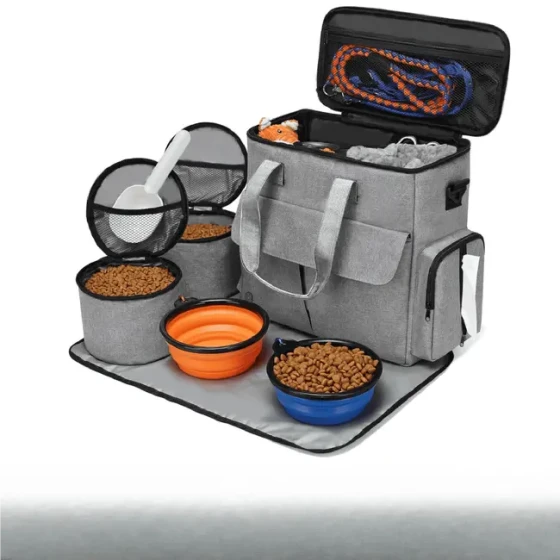Can Cats Eat Cookies_Potential Risks and Precautions of Cats Eating Cookies

In short, it is not recommended for cats to eat cookies. Cats are obligate carnivores, and their digestive systems and nutritional needs are completely different from humans. Cookies designed for humans not only fail to provide essential nutrients for cats but may also pose potential health hazards due to their content of sugars, fats, and various toxic substances to cats, causing anything from mild gastrointestinal discomfort to life-threatening conditions.
Why Can’t Cats Eat Cookies? Potential Health Risks and "Dangerous" Ingredients
Many cat owners often face the situation where their cats beg for cookies while they enjoy the treats. However, a loving heart should not turn into a harmful act. For cats, cookies are like a "Pandora's box" full of hidden dangers. Let’s analyze these risks in detail:
1. Nutritional Imbalance: Cats Are "Obligate Carnivores"
First, the physical structure of cats dictates that they are strict carnivores, meaning their daily diet should mainly consist of meat to obtain enough protein, essential fatty acids (such as taurine), and vitamins. Cookies mainly contain flour, sugar, and fats, which are not only difficult for cats to digest and absorb but also occupy their already limited stomach capacity, preventing enough nutrient intake from meat. Prolonged consumption may lead to malnutrition in cats.
2. High Sugar and Fat: A "Sweet Killer" for Pet Health
Cookies often contain large amounts of sugar and fat. Excess sugar intake can cause weight gain and obesity in cats, which is the root of many chronic diseases like diabetes, heart disease, and arthritis. A high-fat diet may cause pancreatitis, a painful and potentially fatal disease where cats exhibit severe vomiting, diarrhea, and abdominal pain. Imagine if your cat indulged in several sugary and fatty desserts daily like us—it would definitely struggle to maintain health.
3. Hidden "Poisons": Several Common Cookie Ingredients Are Toxic to Cats
This is the most critical and dangerous point. Many cookie ingredients considered harmless to humans are highly toxic to cats:
- Chocolate: Chocolate contains theobromine and caffeine, both highly toxic to cats. Even small amounts can cause poisoning with symptoms including vomiting, diarrhea, arrhythmia, tremors, seizures, and even death. The higher the cocoa content (such as dark chocolate), the stronger the toxicity.
- Xylitol: Many sugar-free or low-sugar cookies use xylitol as a sweetener. While harmless to humans, xylitol rapidly triggers massive insulin release in cats and dogs, causing a sudden drop in blood sugar that leads to hypoglycemia and, in severe cases, liver failure. Even tiny amounts can cause serious outcomes.
- Raisins/Grapes: Some cookies contain raisins. Although the toxicity of grapes and raisins to cats’ kidneys is not fully clear, they have been confirmed to cause acute kidney failure in some cats. To be safe, avoid any grape or raisin products for cats.
- Onion and Garlic Powder: Some savory or flavored cookies may contain onion or garlic powder. These ingredients damage cats’ red blood cells, causing hemolytic anemia. Symptoms can include lethargy, weakness, and rapid breathing.
- Caffeine: Besides chocolate, some coffee-flavored cookies contain caffeine. Caffeine strongly stimulates the nervous system of cats, possibly causing rapid heartbeat, high blood pressure, and seizures.
- Dairy Products: Though usually present in small amounts, many cats are lactose intolerant. Lactose ingestion may cause diarrhea, bloating, and other gastrointestinal discomforts.
- Nuts: Some nuts, like macadamia nuts, are toxic to cats. Even non-toxic nuts’ high fat content can trigger pancreatitis.
4. Digestive Problems: Gastrointestinal "Suffering"
The starches and complex carbohydrates in cookies are difficult for cats to digest because they lack the enzymes needed to break them down. Eating cookies can easily cause indigestion, vomiting, diarrhea, constipation, or abdominal discomfort, making cats vomit and have diarrhea, feeling listless.
What to Do If Your Cat Accidentally Eats Cookies? Emergency Guide
If your cat accidentally eats cookies, do not panic but stay alert and take the correct steps:
-
Stay Calm and Assess the Situation:
- How much was eaten? Try to estimate the quantity of cookies ingested.
- What kind of cookies? Keep the packaging if available, so the vet can check the ingredients.
- Are there toxic ingredients? Check the ingredient list carefully for chocolate, xylitol, raisins, onion, garlic, etc.
- How is the cat’s condition? Watch for abnormal signs like vomiting, diarrhea, drooling, lethargy, seizures, or rapid breathing.
-
Contact Your Veterinarian Immediately:
- This is the most important step. Even if the cat appears fine, call your vet immediately and explain the situation in detail. The vet will offer professional advice based on the cat’s weight, amount eaten, and cookie ingredients.
- Do NOT induce vomiting yourself! Unless directed by a vet, do not try to make your cat vomit as it can cause serious complications like aspiration pneumonia.
-
Follow the Veterinarian’s Instructions:
- The vet may suggest home observation or bring your cat in immediately for treatment like induced vomiting, gastric lavage, IV fluids, or other supportive care. Early detection and treatment minimize risks.
Good News for "Snack-Loving Cats": Healthy Alternative Treats
Since cookies are a minefield, what healthy treats can we offer cats who look at us with longing eyes?
- Cat-specific Treats: There are many treats tailor-made for cats, such as freeze-dried chicken, freeze-dried fish, and cat sticks. These are usually high-protein, low-fat, free of harmful ingredients, and rich in necessary nutrients like taurine.
- Cooked, Unseasoned Meat: Small amounts of cooked chicken breast or fish (boneless and unseasoned) can be given occasionally as rewards. Ensure thorough cooking to avoid parasite risks.
- Catnip: If your cat reacts to catnip, giving some to play with or consume can help them relax and feel happy.
- Pet Canned or Wet Food: Small amounts of quality pet canned or wet food can also be treats, offering good palatability and moisture supplementation.
Frequently Asked Questions (FAQ)
Q1: Will my cat be okay if it eats a small piece of regular cookie?
A1: It depends on the cookie’s ingredients and the cat’s sensitivity. A small piece of regular cookie without toxic ingredients like chocolate, xylitol, or raisins and if the cat is relatively large may only cause mild gastrointestinal upset like vomiting or diarrhea. Regardless, observe your cat’s condition and consult a vet if uncertain, as the saying "illness enters through the mouth" also applies to cats.
Q2: Can I make "healthy" cookies for my cat myself?
A2: Theoretically, if you ensure all ingredients are safe and control nutritional balance strictly, you can try. However, meeting cats’ nutritional needs and safety standards is challenging. Many mature commercial cat treats are available that are safer, more nutritious, and more convenient. Unless you have professional pet nutrition knowledge, it’s not recommended to make your own cat treats to avoid unintended harm.
Q3: Why is my cat so interested in cookies?
A3: Cats show curiosity towards novel food smells and textures. Cookies are often fragrant and crispy, which can attract cats. Their sense of smell and taste differ from humans, and sometimes their preference isn’t based on nutrition but mere curiosity or attraction to certain ingredients. Just like some cats enjoy sniffing stinky socks, it’s unrelated to "health."
Q4: How soon will my cat react after eating cookies?
A4: This depends on the type and amount of cookies ingested and the cat’s sensitivity to specific ingredients. Mild gastrointestinal discomfort may occur within a few hours. Poisoning symptoms from toxic ingredients (such as chocolate or xylitol) can appear between 30 minutes to 12 hours, and sometimes later. Therefore, contacting a vet promptly after accidental ingestion is crucial.
Conclusion
As responsible cat owners, we must provide ample food and water but also ensure dietary safety and health. Although cookies are common human snacks, for beloved cats they are potential health traps. For the longevity and health of your cat, be sure to "manage the mouth and move the legs"—control what your cat eats, avoid unsafe foods, and encourage exercise for a healthy life. Instead of giving them human cookies, choose pet treats designed specifically for them so they can enjoy deliciousness while staying energetic and healthy.
-560x560.webp)


-560x560.webp)

